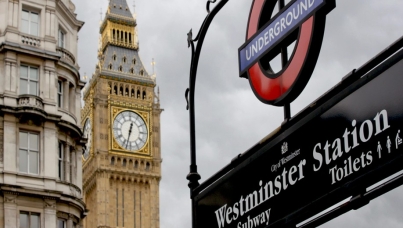Whom Do We Trust? Neither Politicians Nor Journalists!
Whom do we trust? Certainly not politicians nor journalists. Doctors, yes, and no doubt nurses. Certainly teachers, professors, judges and priests, but not everyone trusts even them to tell the truth. One person in five say they don't believe that either judges or the clergy can be trusted.
The Financial Times reported these results, focusing on business leaders, and to my surprise headlined the story "Business leaders enjoy revival in public trust", basing their headline on business leaders moving up form 25% last year to 28% this, a barely statistically significant three percentage points. If the FT does this to make their readers feel good, then little wonder that journalists rate bottom of the poll for their veracity, and the FT is thought generally to be the best of the lot.
I sit on the Science and Society Committee of the Royal Society, and am always taken somewhat aback by the hand wringing of the scientific community over their nostalgic belief that things aren't what they used to be in terms of the degree with which they are regarded by the rest of us in some awe. I suspect they never were! For the six years we've been tracking trust in scientists, there's been no change whatsoever in the percentage who say they trust scientist, and over the same period the percentage who say they don't trust scientists to tell the truth has actually fallen.
When you break it down, scientists who work in universities and environmental groups are trusted by most people, while scientists working for industry and government are not, according to work we've done recently for the University of East Anglia. This study also found that a majority of the public agrees that the government distorts facts in its favour on a number of current issues, such as climate change, radioactive waste and GMOs. At the same time, a majority rejects that the government is listening to public concerns about these issues.
There's actually been an increase over the years in the number of British adults who say they trust doctors, and also teachers, while clergymen and priests have taken somewhat of a knock. Sadly there's been a decline in the degree to which the ordinary man/woman in the street regard their fellow man/women in the street, as while nearly two thirds said they felt they could trust themselves, so to speak, in 1993, by last year this had fallen by ten points, and now just a bare majority say their fellow citizen can be trusted, and a thirds are wary.
What have civil servants done to deserve their increased ratings? Still fewer than half the public say they feel they can trust civil servants, 46% currently, the same as pollsters by the way, but when we started this lark for the Sunday Times in 1983, only one person in four said they, civil servants that is, were straight. In other words, they've doubled over the past two decades.
I recall when the head of the Central Statistical Office, the late Sir John Boreham, called me in to discuss my findings: "Why the next thing you know, they won't be trusting government statistics!" he exclaimed. I just about fell off my chair laughing, and when I recovered reminded him that they'd changed the way the calculate the unemployment rate had reached 17, four years into the Thatcher administration's period of office.
Seriously, this is a serious problem, government ministers having three quarters of their citizens saying they are not to be trusted, and the Blair Government is suffering the consequences of this now when they need it most, and they have only themselves to blame.
MORI Veracity Index
Q. " ... would you tell me if you generally trust them to tell the truth, or not?"
| 160 | Tell the truth | Not tell the truth | Net Tell the truth | |||||||||||||||||||||
|---|---|---|---|---|---|---|---|---|---|---|---|---|---|---|---|---|---|---|---|---|---|---|---|---|
| 160 | '83 | '93 | '97 | '99 | '00 | '01 | '02 | '03 | '83 | '93 | '97 | '99 | '00 | '01 | '02 | '03 | '83 | '93 | '97 | '99 | '00 | '01 | '02 | '03 |
| Occupations | % | % | % | % | % | % | % | % | % | % | % | % | % | % | % | % | % | % | % | % | % | % | % | % |
| Doctors | 82 | 84 | 86 | 91 | 87 | 89 | 91 | 91 | 14 | 11 | 10 | 7 | 9 | 7 | 6 | 6 | 68 | 73 | 76 | 84 | 78 | 82 | 85 | 85 |
| Teachers | 79 | 84 | 83 | 89 | 85 | 86 | 85 | 87 | 14 | 9 | 11 | 7 | 10 | 10 | 10 | 8 | 65 | 75 | 72 | 82 | 75 | 76 | 75 | 79 |
| Professors | n/a | 70 | 70 | 79 | 76 | 78 | 77 | 74 | n/a | 12 | 12 | 10 | 11 | 10 | 11 | 11 | n/a | 58 | 58 | 69 | 65 | 68 | 66 | 63 |
| Judges | 77 | 68 | 72 | 77 | 77 | 78 | 77 | 72 | 18 | 21 | 19 | 16 | 15 | 15 | 15 | 19 | 59 | 47 | 53 | 61 | 62 | 63 | 62 | 53 |
| Clergyman/Priests | 85 | 80 | 71 | 80 | 78 | 78 | 80 | 71 | 11 | 13 | 20 | 14 | 16 | 15 | 14 | 20 | 74 | 67 | 51 | 66 | 62 | 63 | 66 | 51 |
| Scientists | n/a | n/a | 63 | 63 | 63 | 65 | 64 | 65 | n/a | n/a | 22 | 27 | 25 | 22 | 23 | 22 | n/a | n/a | 41 | 36 | 38 | 43 | 41 | 43 |
| Television news readers | 63 | 72 | 74 | 74 | 73 | 75 | 71 | 66 | 25 | 18 | 14 | 17 | 18 | 17 | 19 | 24 | 38 | 54 | 60 | 57 | 55 | 58 | 52 | 42 |
| The Police | 61 | 63 | 61 | 61 | 60 | 63 | 59 | 64 | 32 | 26 | 30 | 31 | 33 | 27 | 31 | 26 | 29 | 37 | 31 | 30 | 27 | 36 | 28 | 38 |
| The ordinary man/woman in the street | 57 | 64 | 56 | 60 | 52 | 52 | 54 | 53 | 27 | 21 | 28 | 28 | 34 | 34 | 31 | 32 | 30 | 43 | 28 | 32 | 18 | 18 | 23 | 21 |
| Pollsters | n/a | 52 | 55 | 49 | 46 | 46 | 47 | 46 | n/a | 28 | 28 | 35 | 35 | 34 | 35 | 34 | n/a | 24 | 27 | 14 | 11 | 12 | 12 | 12 |
| Civil Servants | 25 | 37 | 36 | 47 | 47 | 43 | 45 | 46 | 63 | 50 | 50 | 41 | 40 | 45 | 42 | 41 | -38 | -13 | -14 | 6 | 7 | -2 | 3 | 5 |
| Trade Union officials | 18 | 32 | 27 | 39 | 38 | 39 | 37 | 33 | 71 | 54 | 56 | 47 | 47 | 46 | 49 | 53 | -53 | -22 | -29 | -8 | -9 | -7 | -12 | -20 |
| Business Leaders | 25 | 32 | 29 | 28 | 28 | 27 | 25 | 28 | 65 | 57 | 60 | 60 | 60 | 61 | 62 | 60 | -40 | -25 | -31 | -32 | -32 | -34 | -37 | -32 |
| Government Ministers | 16 | 11 | 12 | 23 | 21 | 20 | 20 | 20 | 74 | 81 | 80 | 70 | 72 | 73 | 72 | 73 | -58 | -70 | -68 | -47 | -51 | -53 | -52 | -53 |
| Politicians generally | 18 | 14 | 15 | 23 | 20 | 17 | 19 | 18 | 75 | 79 | 78 | 72 | 74 | 77 | 73 | 75 | -57 | -65 | -63 | -49 | -54 | -60 | -54 | -57 |
| Journalists | 19 | 10 | 15 | 15 | 15 | 18 | 13 | 18 | 73 | 84 | 76 | 79 | 78 | 75 | 79 | 75 | -54 | -74 | -61 | -64 | -63 | -57 | -66 | -57 |
Base: 2,141 British Adults Aged 16+, most recent fieldwork 6-10 February 2003
Technical details
The poll was conducted for the British Medical Association by MORI Social Research Institute. A representative sample of 2,141 adults aged 15 and over were interviewed in home face-to-face at 201 sampling points in |England, Wales and Scotland between 6-10 February 2003
This article was first published in the Parliamentary Monitor
Sir Robert Worcester is Chairman of MORI



